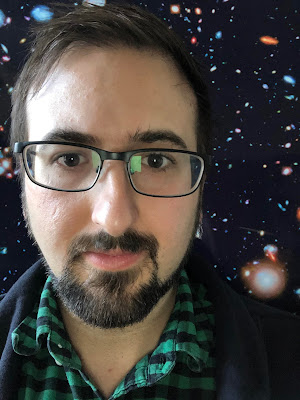Professor Profile: Dr. Joshua DiCaglio on Scale, Rhetoric, and Mysticism (and yes, they're all related)
At the beginning of his academic career, Dr. DiCaglio started out studying English at the University of South Carolina where his studies later evolved into a self-designed major in the Rhetoric of Science and Technology. Going into his graduate education at Pennsylvania State University, Dr. DiCaglio focused his research on the Rhetoric of Nanotechnology. Through this work, Dr. DiCaglio realized he was working under a notion that we hardly understand: scale.
“I couldn’t find anyone who had specifically thought about how scale gets developed as a notion or discourse,” Dr. DiCaglio said. “This conceptual tool— scale—sifts between all these different interests, concerns, and rhetorical forms. It’s there in the middle of them. When we talk about viral transmissions, we talk about them in one moment as microscopic entities, then another time we’re talking about them in terms of planetary flows. We have just switched the way we are talking about reality, and we don’t even realize that we’re doing that or what the conditions are for doing that.”
The power of scale as a conceptual tool is, to Dr. DiCaglio, extreme. “It’s like being armed with a nuclear weapon and not knowing that’s what you’ve got. That’s what our rhetorical forms are. We have all of these incredibly powerful ways of talking about reality, and they’re doing stuff to us,” he said. “Literally, we’re doing stuff to DNA. We’re doing stuff on the planetary scale in the form of ecological alterations of the planetary landscape. We’re doing this stuff, and we don’t even fully understand the conditions and what that discourse is doing to us. That’s what ultimately makes it a rhetorical question and not a philosophical one.”Through his research, Dr. DiCaglio found that when scientists developed or discovered a scalar view, such as Earth’s blue marble image from the moon, they nearly always struggled to articulate its significance. Commonly, the solution would be to turn to the rhetoric of mysticism, even though these scientists and their findings suddenly became “unscientific.” Dr. DiCaglio argued that there is a reason for this.
“Scientists find themselves articulating, in the most rhetorical way that they can, closest to mysticism. That’s because mystics have been developing scalar language for thousands of years,” said Dr. DiCaglio. “Mysticism arises when one personally encounters reality outside of the human scale. Mystics develop language and practices for observing and working with these changes in scale. This is why mysticism is about scale, but it’s also why it’s about rhetoric: mystical rhetoric attempts to reorient you to nonhuman scales.”
For anyone who has ever taken a class Dr. DiCaglio, mysticism is a familiar topic of discussion. The similarities between Dr. DiCaglio and his class offerings are not accidental. “My teaching and my research mesh together pretty well because I always teach the things that I’m thinking about,” he said.
Dr. DiCaglio’s class offerings for undergraduate students include English 481 Senior Seminars, in which he rotates topics between Rhetoric of Space and an in-depth look at the works of Phillip K. Dick called “This is your brain on information.” In addition, he also teaches English 354: Modern Rhetorical Theory, English 303: History of Rhetoric and English 320: Technical Editing.
“Students will get a really interesting mix of things from me,” DiCaglio said. “In one class I might talk a lot about science, in another class I might talk a lot about rhetoric, and then I teach the tech editing class.”
“In certain ways, I am sort of a different person in each of [the classes],” Dr. DiCaglio said. While the classes he teaches might seem very different, Dr. DiCaglio does not think they should be considered entirely separate subjects within the English major.
“It doesn’t have to be mutually exclusive. In fact, the argument is that you're better at rhetoric if you have a better sense of your rhetorical situation, then you can also do these very practical things,” Dr. DiCaglio said. “As English majors, we need to get good at those things, rather than just refusing it.”
For his work in the ENGL 320: Technical Editing class, Dr. DiCaglio received the CTE Montague Fellows award, which is a University-wide award, last year. Part of the award is dedicated to developing the Technical Editing Wikipedia project Dr. DiCaglio created in which students analyze, interact with, and comprehensively edit Wikipedia articles.
“When I go into something, I really get into it,” Dr. DiCaglio said. “I’m just really fascinated in what I teach.”



Comments
Post a Comment